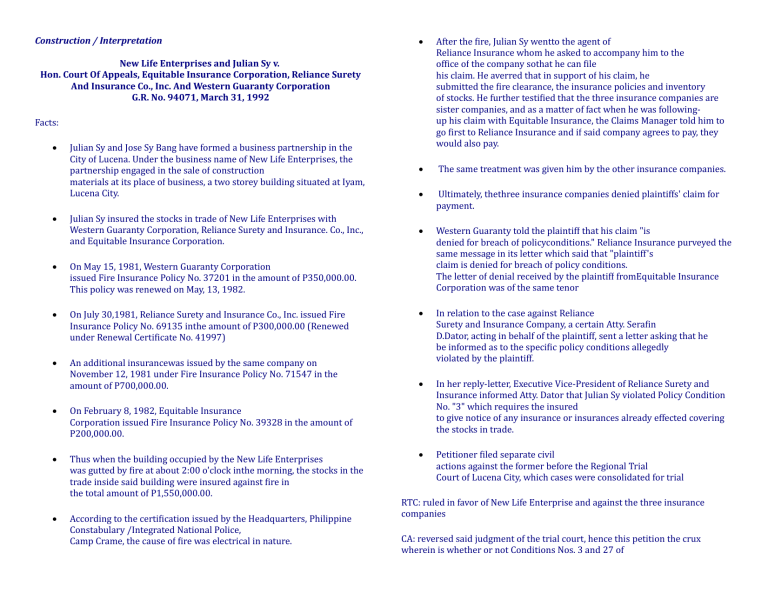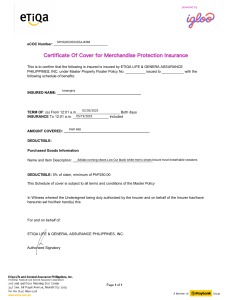
Construction / Interpretation Julian Sy and Jose Sy Bang have formed a business partnership in the City of Lucena. Under the business name of New Life Enterprises, the partnership engaged in the sale of construction materials at its place of business, a two storey building situated at Iyam, Lucena City. After the fire, Julian Sy wentto the agent of Reliance Insurance whom he asked to accompany him to the office of the company sothat he can file his claim. He averred that in support of his claim, he submitted the fire clearance, the insurance policies and inventory of stocks. He further testified that the three insurance companies are sister companies, and as a matter of fact when he was followingup his claim with Equitable Insurance, the Claims Manager told him to go first to Reliance Insurance and if said company agrees to pay, they would also pay. The same treatment was given him by the other insurance companies. Ultimately, thethree insurance companies denied plaintiffs' claim for payment. Julian Sy insured the stocks in trade of New Life Enterprises with Western Guaranty Corporation, Reliance Surety and Insurance. Co., Inc., and Equitable Insurance Corporation. Western Guaranty told the plaintiff that his claim "is denied for breach of policyconditions." Reliance Insurance purveyed the same message in its letter which said that "plaintiff's claim is denied for breach of policy conditions. The letter of denial received by the plaintiff fromEquitable Insurance Corporation was of the same tenor In relation to the case against Reliance Surety and Insurance Company, a certain Atty. Serafin D.Dator, acting in behalf of the plaintiff, sent a letter asking that he be informed as to the specific policy conditions allegedly violated by the plaintiff. In her reply-letter, Executive Vice-President of Reliance Surety and Insurance informed Atty. Dator that Julian Sy violated Policy Condition No. "3" which requires the insured to give notice of any insurance or insurances already effected covering the stocks in trade. Petitioner filed separate civil actions against the former before the Regional Trial Court of Lucena City, which cases were consolidated for trial New Life Enterprises and Julian Sy v. Hon. Court Of Appeals, Equitable Insurance Corporation, Reliance Surety And Insurance Co., Inc. And Western Guaranty Corporation G.R. No. 94071, March 31, 1992 Facts: On May 15, 1981, Western Guaranty Corporation issued Fire Insurance Policy No. 37201 in the amount of P350,000.00. This policy was renewed on May, 13, 1982. On July 30,1981, Reliance Surety and Insurance Co., Inc. issued Fire Insurance Policy No. 69135 inthe amount of P300,000.00 (Renewed under Renewal Certificate No. 41997) An additional insurancewas issued by the same company on November 12, 1981 under Fire Insurance Policy No. 71547 in the amount of P700,000.00. On February 8, 1982, Equitable Insurance Corporation issued Fire Insurance Policy No. 39328 in the amount of P200,000.00. Thus when the building occupied by the New Life Enterprises was gutted by fire at about 2:00 o'clock inthe morning, the stocks in the trade inside said building were insured against fire in the total amount of P1,550,000.00. According to the certification issued by the Headquarters, Philippine Constabulary /Integrated National Police, Camp Crame, the cause of fire was electrical in nature. RTC: ruled in favor of New Life Enterprise and against the three insurance companies CA: reversed said judgment of the trial court, hence this petition the crux wherein is whether or not Conditions Nos. 3 and 27 of the insurance contracts were violated by petitioners thereby resulting in their forfeiture of all the benefits thereunder. The insured is specifically required to disclose to the insurer any other insurance and its particulars which he may have effected on the same subject matter. The coverage by other insurance or co-insurance effected or subsequently arranged by petitioners were neither stated nor endorsed in the policies of the three (3) private respondents, warranting forfeiture of all benefits thereunder if we are to follow the express stipulation in the aforequoted Policy Condition No. 3. The knowledge of such insurance by the insurer's agents, even assuming the acquisition thereof by the former, is not the "notice" that would estop the insurers from denying the claim. Besides, the so-called theory of imputed knowledge, that is, knowledge of the agent is knowledge of the principal, aside from being of dubious applicability here has likewise been roundly refuted by respondent court whose factual findings we find acceptable. Thus, it points out that while petitioner Julian Sy claimed that he had informed insurance agent Alvarez regarding the coinsurance on the property, he contradicted himself by inexplicably claiming that he had not read the terms of the policies; that Yap Dam Chuan could not likewise have obtained such knowledge for the same reason, aside from the fact that the insurance with Western was obtained before those of Reliance and Equitable; and that theconclusion of the trial court that Reliance and Equitable are "sister companies" is an unfounded conjecture drawn from the mere fact that Yap Kam Chuan was an agent for both companies which also had the same insuranceclaims adjuster. Availment of the services of the same agents and adjusters by different companies is a common practice in the insurance business and such facts do not warrant the speculative conclusion of the trial court. Petitioners contention: Furthermore, when the words and language of documents are clear and plain or readily understandable by an ordinary reader thereof, there is absolutely no room for interpretation or construction anymore. Courts are not allowed to make contracts for the parties; rather, they will intervene only when the terms of the policy are ambiguous, equivocal, or uncertain. The parties must abide by the terms of the contract because such terms constitute the measure of the insurer's liability and compliance therewith is a condition precedent to the insured's right of recovery from the insurer. While it is a cardinal principle of insurance law that a policy or contract of insurance is to be construed liberally infavor of the insured and strictly against the insurer company, yet contracts of insurance, like other contracts, are to be construed according to the sense and meaning of the terms which the parties themselves have used. If suchterms are clear and Condition No. 3 of said insurance policies, otherwise known as the "Other Insurance Clause," is uniformly contained in all the aforestated insurance contracts of herein petitioners, as follows: 3. The insured shall give notice to the Company of any insurance or insurances already effected, or which may subsequently be effected, covering any of the property or properties consisting of stocks intrade, goods in process and/or inventories only hereby insured, and unless such notice be given and the particulars of such insurance or insurances be stated therein or endorsed on this policy pursuant to Section 50 of the Insurance Code, by or on behalf of the Company before the occurrence of any loss or damage, all benefits under this policy shall be deemed forfeited, provided however, that this condition shall not apply when the total insurance or insurances in force at the time of loss or damage not more than P200,000.00. 1. that they are not to be blamed for the omissions, alleging that insurance agent Leon Alvarez (for Western) and Yap Kam Chuan (for Reliance and Equitable) knew about the existence of the additional insurance coverage and that they were not informed about the requirement that such other or additional insurance should be stated in the policy, as they have not even read policies. Issue: WON Syu can claim against the three insurance companies. Ruling: No. The terms of the contract are clear and unambiguous. unambiguous, they must be taken and understood in their plain, ordinary and popular sense. Moreover, obligations arising from contracts have the force of law between the contracting parties and should becomplied with in good faith. The conformity of the insured to the terms of the policy is implied from his failure to express any disagreement with what is provided for. It may be true that the majority rule, as cited by petitioners, is that injured persons may accept policies without reading them, and that this is not negligence per se. But, this is not without any exception. It is and was incumbent upon petitioner Sy to read the insurance contracts, and this can be reasonably expected of him considering that he has been a businessman since 1965 and the contract concerns indemnity in case of loss in his money-making trade of which important consideration he could not have been unaware as it was pre-in case of loss in his money-making trade of which important consideration he could not have been unaware as it was precisely the reason for his procuring the same. The obvious purpose of the aforesaid requirement in the policy is to prevent over-insurance and thus avert the perpetration of fraud. The public, as well as the insurer, is interested in preventing the situation in which a fire would be profitable to the insured. According to Justice Story: "The insured has no right to complain, for he assents to comply with all the stipulations on his side, in order to entitle himself to the benefit of the contract, which, upon reason or principle, he has no right to ask the court to dispense with the performance of his own part of the agreement, and yet to bind the other party to obligations, which, but for those stipulations, would not have been entered into." By reason of said unrevealed insurances, the insured had been guilty of a false declaration; a clear misrepresentation and a vital one because where the insured had been asked to reveal but it did not, that was deception. As the insurance policy against fire expressly required that notice should be given by the insured of other insurance upon the same property, the total absence of such notice nullifies the policy. Furthermore, assuming arguendo that petitioners felt the legitimate need to be clarified as to the policy condition violated, there was a considerable lapse of time from their receipt of the insurer's clarificatory letter dated March 30, 1983, up to the time the complaint was filed in court on January 31, 1984. The oneyear prescriptive period was yet to expire on November 29, 1983, or about eight (8) months from the receipt of the clarificatory letter, but petitioners let the period lapse without bringing their action in court. We accordingly find no "peculiar circumstances" sufficient to relax the enforcement of the one-year prescriptive period and we, therefore, hold that petitioners' claim was definitely filed out of time.



